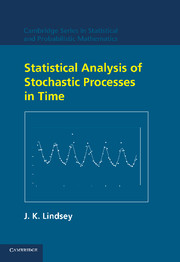1 - What is a stochastic process?
Published online by Cambridge University Press: 03 February 2010
Summary
Intuitively, a stochastic process describes some phenomenon that evolves over time (a process) and that involves a random (a stochastic) component. Empirically, we observe such a process by recording values of an appropriate response variable at various points in time. In interesting cases, the phenomenon under study will usually depend on covariates. Some of these may also vary over time, whereas others will define the differing (static) conditions under which various ‘copies'ss of the process occur.
Definition
Thus, a stochastic process involves some response variable, say Yt, that takes values varying randomly in some way over time t (or space, although that will not be considered here). Yt may be a scalar or a vector, but I shall concentrate primarily on scalar responses in this text (see, however, Section 8.3). Generally, in the study of such processes, the term,‘random’ is replaced by ‘stochastic’; hence, the name.
An observed value or realisation yt of the response variable Yt is called the state of the process at time t. We might call an observation of the state of a process an event. However, I shall restrict the meaning of event to the occurrence of a change of state space. Thus, the number of possible different events will dependence, among other things, on the number of distinct states.
More generally, the probability of the process being in some given state at some point in time may depend on some function of previous events and of covariates. Usually, the probabilities of possible events will be conditional on the state of the process. Such relationships will thus be determined by the type of model being fitted.
Information
- Type
- Chapter
- Information
- Statistical Analysis of Stochastic Processes in Time , pp. 3 - 17Publisher: Cambridge University PressPrint publication year: 2004
